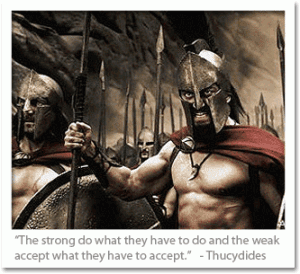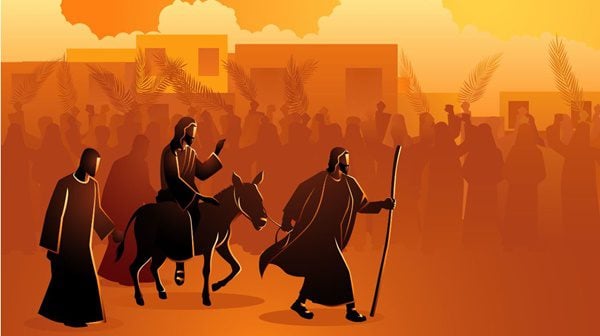 I have long been aware of mimetic theory’s critique of philosophy’s inability to tell the truth about violence. The depth of the problem, however, was only recently made clear to me by this article in the New York Times: Abandon (Nearly) All Hope by Simon Critchley, professor of philosophy at the New School for Social Research. In his defense of philosophical realism, Prof. Critchley gives voice to a pervasive misunderstanding of Christianity, one that provides academic cover for the cold and indiscriminate use of violence. Despite the patience required to untangle the many errors in the professor’s thinking, I felt unable to remain silent and so have waded in with this article. I hope others will chime in as well.
I have long been aware of mimetic theory’s critique of philosophy’s inability to tell the truth about violence. The depth of the problem, however, was only recently made clear to me by this article in the New York Times: Abandon (Nearly) All Hope by Simon Critchley, professor of philosophy at the New School for Social Research. In his defense of philosophical realism, Prof. Critchley gives voice to a pervasive misunderstanding of Christianity, one that provides academic cover for the cold and indiscriminate use of violence. Despite the patience required to untangle the many errors in the professor’s thinking, I felt unable to remain silent and so have waded in with this article. I hope others will chime in as well.
Prof. Critchley argues that hope is humanity’s curse. Especially in the context of power politics, he insists that hope can be self-destructive. It “blinds us to the reality of the world that we inhabit and causes a sort of sentimental complacency that actually prevents us from seeing things aright and protesting against this administration’s moral and political lapses and those of other administrations.” Putting aside his partisanship, and rather lame attempt to conceal it (“and those of other administrations”), his main point is to deliberately contrast hope with realism. And in true philosophical fashion, he equates hope with blindness and blind hope with Christianity (citing St. Paul’s “hope for what we do not see” and Pres. Obama’s use of Rev. Jeremiah Wright’s phrase, “the audacity of hope). He identifies realism with Greek thought and what he calls the “cheerful realism” of Friedrich Nietzsche.
Is Critchley right to condemn Christian hope as unrealistic? Has the pervasive influence of Christian hope undermined Greek realism, rendering us either complacent or ineffective? I’d like to argue that reality has come into clearer focus under the influence of Christianity and it was the Greeks who were blind, unable to “see things aright”. As my colleague Adam Ericksen explains in his article, A God Torn to Pieces: Good Friday, Nietzsche and Sacrifice, Nietzsche’s modern embrace of Greek blindness led to his rejection of Christ Crucified in favor of Dionysus. To follow Nietzsche’s return to Greek blindness is to court complacency and its frequent companions, nihilism and despair.
You Can’t Handle the Truth!
I’d like to introduce a word that Prof. Critchley did not use in his article: truth. He used the phrase “seeing things aright” and he bandied about “realism” and “reality” but he never once uttered the word “truth”. This is a notable omission, especially if you are comparing Christianity with Greek philosophical thought. Here’s why.
In his new book, A Refuge of Lies: Reflections on Faith and Fiction, Cesáreo Banderas begins his examination of Western literature with an observation by Erich Auerbach. In his renowned book, Mimesis: The Representation of Reality in Western Literature, Auerbach identified two styles in Western literature “archetypically displayed in Homer’s poems and in the Old Testament.” Banderas observes that Auerbach found a deep difference between them:
“It concerns the truth of each of the two archetypal texts, or rather, the attitude exhibited in those texts with regard to the truth of what they narrate. Coming to the Bible after an extensive and meticulous analysis of Homer’s style, Auerbach is indeed quite properly amazed at the Bible’s ‘passionate’ concern for, and interest in, the truth of what it says. For that is precisely what he never found in Homer.” (1-2, emphasis mine)
I think Prof. Critchley would agree that “realism” must concern itself with the truth. But he disagrees with Auerbach and Banderas’ characterization of Homeric Greek literature. He insists that it is Greek philosophy and not Christianity that “sees things aright” (“sees the truth of things” might be a more straightforward way of saying it). As proof, he offers an account of power politics by the ancient historian Thucydides, calling it “sober and unsentimental”. In his History of the Peloponnesian War, Chapter XVII, Thucydides’ presents what we might call a transcript of a negotiation between representations of the powerful Athenian empire and the small, weak island of Melos. The Athenians’ are attempting to get the people of the small island of Melos to capitulate in the face of the threat of certain annihilation. When the Melians refuse, here’s what happened, according to Thucydides:
“[The Athenians] killed all the men of military age and made slaves of the women and children.”
Prof. Critchley calls this a “breathtaking understatement” and praises the “impartiality” with which Thucydides “presents us with a real situation.” But I wonder if giving an impartial account of the mass slaughter and enslavement of a people – in other words, genocide – is truly something to admire.
Sacred Lies
Thucydides’ account may be accurate as far as it goes, but it does not go far enough. To our ears, the reporting of the bare facts of the Athenian rout does not leave us “sober and unsentimental”. We cannot help but imagine the suffering and death, the horror and pain, of that scene. A true account of what happened to the Melians that day is not possible without including their perspective. Perhaps Thucydides’ “impartiality” is a steadfast refusal to tell us the truth about the violence suffered by the Melians. In other words, Thucydides is not interested in the truth but is actively engaged in concealing – lying about – the violence that was unleashed on the island of Melos so very long ago.
Calling Thucydides a liar is not a compliment, though I doubt he’d be offended. He might even be pleased. Ancient Greek poetry and the religion it supported consisted of telling as convincingly as possible “divinely inspired lies” (Banderas, 22). These lies were about the nature of things, in particular, as is the case with the so called history presented by Thucydides, about the nature of violence. The ancient system of blood sacrifice depended on maintaining the illusion that violence on an altar against a sacrificial animal (and all too often a human being) was divinely ordained and not to be thought of as murder. In the same way, a genocide against the weak and defenseless must be reported “impartially” so as not to undermine the exclusive right of the empire to use violence and be praised for it.
Prof. Critchley rightly invokes the philosopher Friedrich Nietzsche at this point. Here’s Critchley again commenting on Nietzsche’s response to Greek realism: “What we need in the face of what Nietzsche calls ‘a strict, hard factuality,’ is not hope, but ‘courage in the face of reality.’” What sort of courage is the Greek-loving Nietzsche advocating?
Christian Realism
Nietzsche’s genius was to recognize the implications of Christian realism: that the God who dies on the cross as a victim of violence spells the end of the ancient world of sacrifice, and therefore the end of the worldview Nietzsche favored, one which privileges power over meekness. Nietzsche wanted to reassert the dominance of the powerful in order to undermine the preference for victims so clearly displayed by the biblical God. He feared that under the influence of Christianity we would not be able to return to the ancient sacrificial system that spawned and was reinforced by Dionysian violence. Why? Because we now cannot keep silent about the very thing Thucydides could not say: that the Melians were murdered. To refuse to say so is not realistic. It’s a lie.
Guiseppe Fornari, in his excellent study of Nietzsche’s philosophy, A God Torn to Pieces: The Nietzsche Case, says, “Nietzsche consciously sought to bring about a new super-humanity that would be capable of sacrifice while it knew that sacrifice was murder.” (xiii) The courage advocated by Nietzsche is the courage to continue to use violence in the name of God or country, even though we know the truth: that if we do so we are murderers. That takes courage, indeed, but not the kind we admire. It’s the courage it takes to hide from a truth that has already been revealed by the cross of Christ, the very thing that Nietzsche rejects. It is the kind of courage that ultimately led to totalitarian regimes and Nazi death camps. I suppose Critchley has a right to call that “cheerful realism,” but I wouldn’t. I’d call it madness.
In Defense of Blind Hope
So what of Christian hope, the “hope for what we do not see”, as Critchley quotes St. Paul as saying? The irony is that it is not Christianity which intentionally blinds us to the truth about violence, but philosophers like Nietzsche and his followers. Philosophy does not see what is right in front of its nose – that its praise of impartiality in the face of slaughter and enslavement is a massive cover-up of the truth. The Christian Gospel reveals that those like Nietzsche and Prof. Critchley who celebrate neutrality in the face of violence, or provide academic cover for those who lie about it, are guilty of aiding and abetting victimizers and murderers. And when Christians remain neutral like Thucydides or give a philosophical account of their own violence, all the more shame on us. (Adam’s excellent article has more on the Christian failure to live out the promise of Christ Crucified.)
So if St. Paul sees the truth of violence, what is the thing he cannot see that he hopes for nonetheless? Let’s allow him to tell us in his own words. This is a passage that precedes the one Prof. Critchley quoted:
“But God chose what is foolish in the world to shame the wise; God chose what is weak in the world to shame the strong; God chose what is low and despised in the world, things that are not, to reduce to nothing things that are, so that no one might boast in the presence of God.” (1 Cor. 1:27-29)
The world’s wisdom is that might makes right, that the gods favor the strong, the survivors, the ones who willingly kill and enslave to protect their own interests. That is what the world sees, but St. Paul sees what the world cannot see yet, a time when these “things that are” will be “reduced to nothing”. Christian hope sees the world for what it is, but refuses to accept that there is nothing we can do about it. Or to say it more truthfully, Christian hope proclaims that something has already been done about it. Proclaiming Christ Crucified as our savior means that we can no longer be impartial in the face of genocide or calmly accept wars of aggression. That’s Christian hope, there for those with eyes to see.











